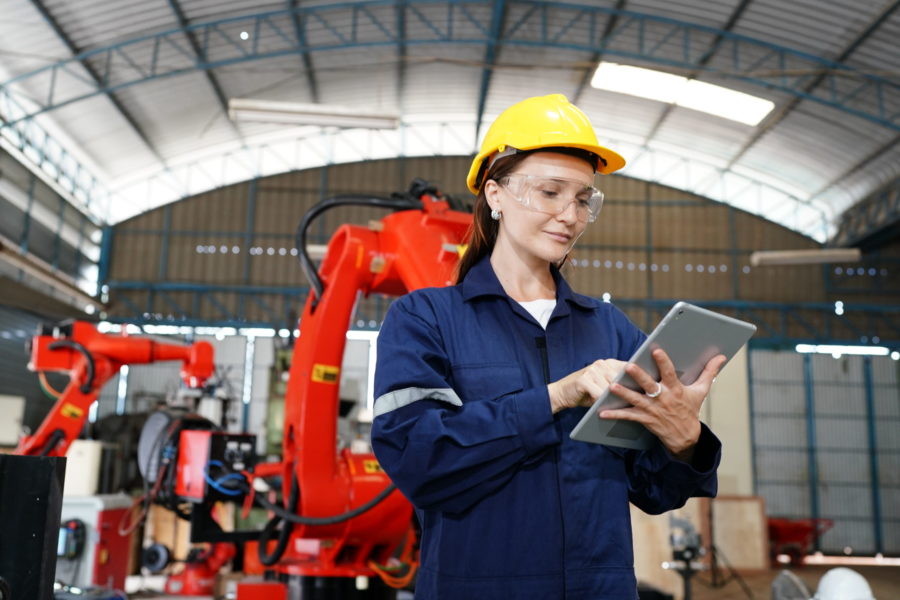
Artificial Intelligence (AI) has catalyzed remarkable transformation across various industries, and manufacturing is no exception. Manufacturing companies leverage AI’s power to enhance efficiency, productivity, and accuracy across multiple processes.
AI has vast potential across the manufacturing value chain—from anticipating equipment failures through predictive maintenance, supply chain optimization, demand forecasting, and quality control. To that end, recent studies indicate that in 2023, the worldwide market for AI in manufacturing was valued at approximately $3.2 billion. By 2028, that number is expected to reach $20.8 billion. If you are a manufacturer, it’s time to start thinking about how you can adopt and implement AI to remain competitive.
At Maximum Possibilities, we understand how AI has and will continue transforming the manufacturing industry by boosting efficiency, reducing costs, and powering innovation.
In this article, we’ll explore four critical ways Artificial Intelligence is changing the manufacturing landscape.
Automation and Predictive Maintenance
AI’s most significant contribution to manufacturing is automation. AI-powered robots and machines can execute repetitive tasks precisely and accurately, reducing human errors and improving production efficiency. These intelligent robots manage complex assembly tasks, packaging, and quality control processes, resulting in faster and more consistent production.
Furthermore, AI-driven predictive maintenance systems are helping manufacturers optimize their operations. Unforeseen downtime is one of the costliest problems manufacturers face. Using machine learning algorithms, systems examine data gathered from sensors within the machines, enabling the prediction of malfunctions or equipment failures before their occurrence.
This proactive approach allows manufacturers to schedule maintenance activities, preventing costly unplanned delays and increasing machinery lifespan.
Quality Control and Defect Detection
AI technology has become crucial for enhancing and optimizing quality control measures. AI-powered computer vision systems inspect products in real time, identifying defects and ensuring that only top-quality products reach the market. These vision systems can detect the most obscure abnormalities or deviations in products, enabling manufacturers to take corrective actions promptly.
Additionally, AI algorithms synthesize historical data to identify patterns associated with product defects. AI systems optimize production parameters by continuously analyzing data from various stages of the manufacturing process. This constant analysis minimizes defects and improves overall product quality.
Supply Chain Optimization
AI is also transforming supply chain management. Today’s complex global supply chains require efficiency. Manufacturers must balance costs, lead times, risks, and sustainability in decision-making. It’s nearly impossible to manually distill and analyze this vast amount of data.
AI-powered systems improve supply chain operations by analyzing immense amounts of data, including customer demand, inventory levels, and supplier performance. The data is then used to accurately forecast demands, streamline logistics, and adjust inventory levels. Manufacturers benefit from cost reduction and improved delivery times.
For example, when looking at AI’s practical application in warehouse management, AI enhances order fulfillment processes. AI-powered systems optimize picking routes, analyze incoming orders, and allocate resources. The result? Fewer errors, faster order processing, and improved customer satisfaction.
Additionally, AI enhances supplier management by automatically monitoring supplier performance, identifying potential issues, and suggesting alternate suppliers when necessary. This level of automation and intelligence enables manufacturers to make data-driven decisions, improving overall efficiency and responsiveness.
AI-Assisted Design and Production Planning
AI is contributing to the development of innovative products through AI-assisted design processes. Consumer demand for personalized products is rising—and AI makes small-batch custom manufacturing financially viable.
AI analyzes data by leveraging machine learning algorithms. This analysis provides insight into customer preferences, market trends, and historical product performance to generate design suggestions and enhance product features. Leveraging these algorithms enables manufacturers to create products that better meet customer needs and preferences, increasing customer satisfaction and loyalty.
AI also assists with production planning by streamlining production schedules and resource allocation. AI algorithms generate efficient production plans by considering various factors like machine capacities, labor availability, and order priorities. Accordingly, manufacturers benefit from reduced lead times and the ability to maximize resource utilization.
Make Your Business’s Future Bright with AI
Artificial Intelligence unlocks game-changing benefits at every stage of manufacturing. Manufacturing companies that fail to implement AI risk falling behind the competition and missing growth opportunities. Manufacturers can improve efficiency, product quality, and operations by capitalizing on AI’s capabilities.
Realizing AI’s full potential requires more than just technology integration. Manufacturers should also focus on upskilling employees through training in AI applications, re-engineering processes to fully leverage AI tools, and aligning performance metrics and incentives to encourage the adoption of AI solutions.
Maximize AI Solutions
While Maximum Possibilities isn’t an AI company, we do understand the importance of maximizing efficiencies for all types of industries including manufacturing. Contact Us to learn the ways we can help you reach your business goals. Our strategic insight will empower you with the understanding to propel your manufacturing business into a growth orbit.
